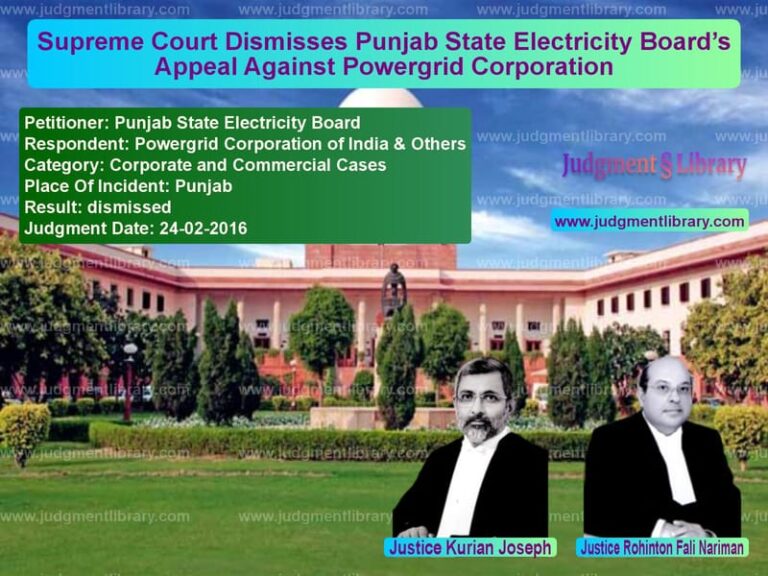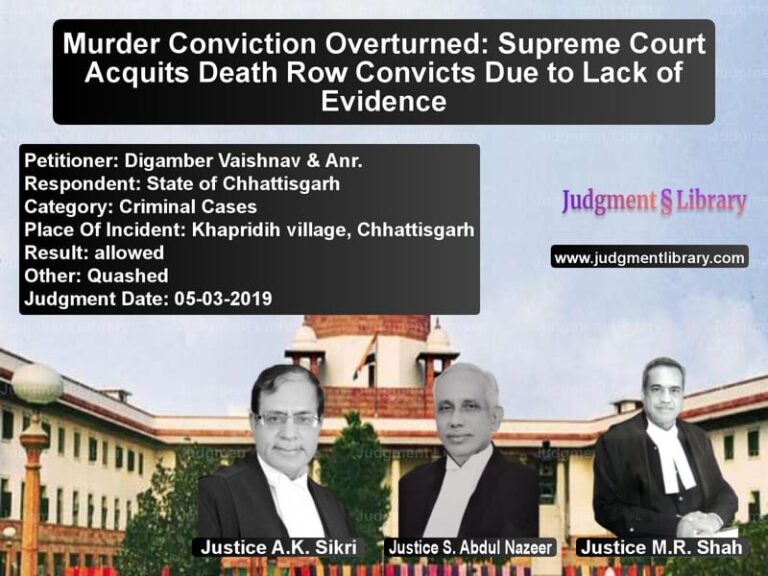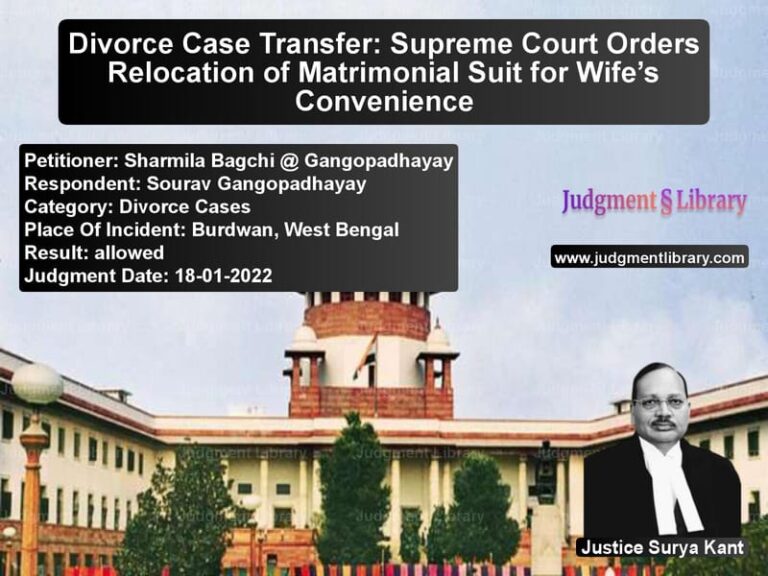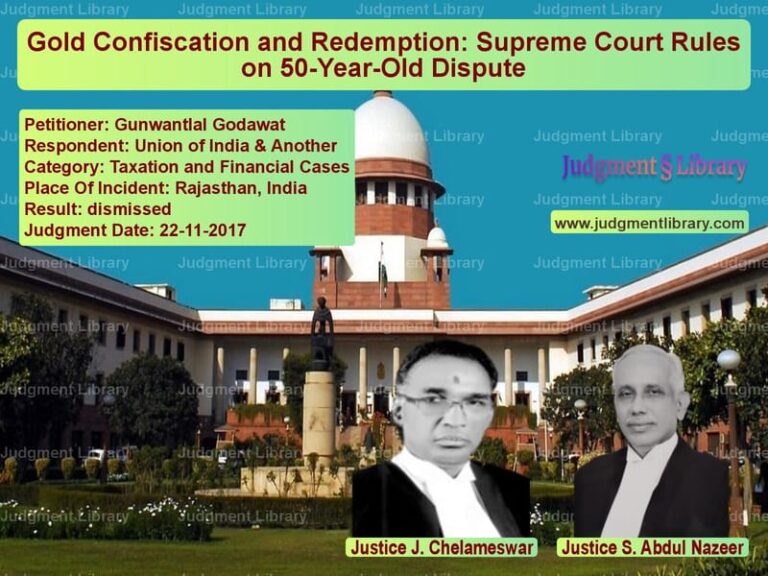Supreme Court Orders Railway Job for Land Acquisition Victim
The case of Anil Kumar vs. Union of India & Ors. is a landmark judgment where the Supreme Court addressed the right of displaced individuals to government employment under the Railway Board’s 2006 policy. The Court examined whether the appellant was wrongfully denied a job in the railway services after his house was acquired for the Ara-Sasaram Railway Project in Bihar.
Background of the Case
The appellant, Anil Kumar, is the son of Lalan Pandey, whose house was fully demolished as part of the land acquisition process for the construction of the Ara-Sasaram railway line.
Key facts of the case:
- The land acquisition process began in 2006, affecting several households, including that of the appellant.
- On June 7, 2008, the Collector of Bhojpur, Ara, submitted a list of displaced individuals, where Lalan Pandey’s name was included at serial number 8.
- On August 8, 2008, the Executive Engineer (Construction), East Central Railway, recommended Anil Kumar’s case for a railway job under the Railway Board’s 2006 policy for land-displaced individuals.
The recommendation letter explicitly stated:
“Sh. Lalan Pandey, s/o Late Ram Naresh Pandey is a completely displaced person due to the construction of the new railway line, and his livelihood has suffered due to displacement.”
Despite multiple correspondences and representations made by Lalan Pandey (before his death in 2011) and later by Anil Kumar, his application for employment in the railways was repeatedly rejected.
Legal Issues
The case raised the following key legal issues:
- Whether Anil Kumar’s claim for employment was valid under the Railway Board’s 2006 circular regarding displaced persons.
- Whether the rejection of his employment application was legally justified.
- Whether the railway authorities erred in considering the acquisition of the house as a mere “strip of land acquisition,” which did not qualify for employment benefits.
Petitioner’s Arguments
The counsel for Anil Kumar contended:
- The 2006 policy clearly allowed for employment in Group ‘D’ posts if a person’s entire house or livelihood was lost due to railway land acquisition.
- The Collector’s list and railway officials’ recommendations confirmed that Lalan Pandey was fully displaced, making Anil Kumar eligible for employment.
- The rejection of his claim was based on an incorrect interpretation of the policy, as it was not merely a case of “strip land acquisition.”
- Multiple letters from railway officials supported Anil Kumar’s claim, yet the authorities refused to act upon them.
- The High Court erred in dismissing the claim by relying on the railway’s argument that no employment had been granted to any displaced persons from the Ara-Sasaram project.
Respondent’s Arguments
The railway authorities and the Union of India argued:
- The 2006 policy was not absolute and did not mandate employment in all cases.
- The land acquired from Anil Kumar’s family was only 0.06 acres, which was categorized as “strip land acquisition” and thus did not qualify for employment.
- The employment policy was discretionary, and there was no legal obligation to provide a job.
- The case did not meet the specific criteria outlined in the policy.
Supreme Court’s Observations
The Supreme Court, led by Justice D.Y. Chandrachud and Justice Navin Sinha, delivered a detailed analysis of the 2006 Railway Board policy and its applicability.
“The rejection of the claim of the appellant was contrary to the terms of the binding policy circular formulated by the Union of India in the Ministry of Railways.”
The Court noted the following:
- The 2006 policy clearly provided employment benefits for individuals whose homes or livelihoods were fully affected.
- There was documentary evidence proving that Lalan Pandey’s house was entirely demolished, making his son eligible for employment.
- The policy aimed at social welfare, and its denial amounted to a failure of social justice.
- The railway authorities provided no valid justification for rejecting Anil Kumar’s claim.
Final Judgment
The Supreme Court ruled in favor of Anil Kumar:
- The appeal was allowed, overturning the Patna High Court’s decision.
- The Supreme Court directed the railway authorities to appoint Anil Kumar to a Group ‘D’ post within two months.
- Age relaxation, if required, was to be granted.
Conclusion
This judgment is a significant step toward ensuring that government policies for displaced persons are implemented fairly. The Supreme Court reaffirmed that the rights of displaced individuals must not be denied due to bureaucratic misinterpretation of policies. By restoring Anil Kumar’s rightful claim, the Court has emphasized the importance of adhering to social welfare commitments and preventing arbitrary decision-making by government bodies.
Petitioner Name: Anil Kumar.Respondent Name: Union of India & Ors..Judgment By: Justice D.Y. Chandrachud, Justice Navin Sinha.Place Of Incident: Bihar.Judgment Date: 22-02-2019.
Don’t miss out on the full details! Download the complete judgment in PDF format below and gain valuable insights instantly!
Download Judgment: Anil Kumar vs Union of India & Ors Supreme Court of India Judgment Dated 22-02-2019.pdf
Direct Downlaod Judgment: Direct downlaod this Judgment
See all petitions in Employment Disputes
See all petitions in Public Sector Employees
See all petitions in Judgment by Dhananjaya Y Chandrachud
See all petitions in Judgment by Navin Sinha
See all petitions in allowed
See all petitions in Remanded
See all petitions in supreme court of India judgments February 2019
See all petitions in 2019 judgments
See all posts in Service Matters Category
See all allowed petitions in Service Matters Category
See all Dismissed petitions in Service Matters Category
See all partially allowed petitions in Service Matters Category







